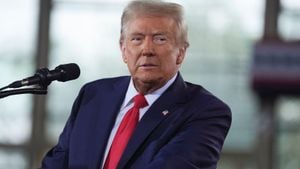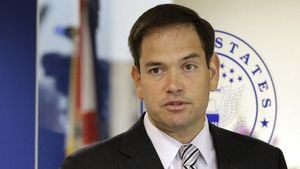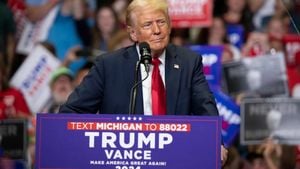At the dawn of his second term, many eye Donald Trump's military strategies with both intrigue and apprehension. Key appointments and potential policies are hinting at how he may administer military power and its applications domestically. With the nomination of Pete Hegseth as Secretary of Defense, discussions arise not just around one man's qualifications but about the broader implication of loyalty within the military ranks. Hegseth's military background mixed with his media persona has drawn both attention and concern from military and political insiders.
During his first administration, Trump often flexed his inclination to use military personnel for domestic operations. Reports of plans to employ the National Guard and federal troops to address various domestic challenges resurfaced during public speeches, showing he still harbors intentions to invoke far-reaching statutes like the Insurrection Act. This act, based on laws dating back over 200 years, allows presidents to deploy military forces during national emergencies, but its application becomes controversial within the current socio-political climate.
Trump's characteristics as president focused primarily on strong defense strategies and addressing issues he considers pressing, such as illegal immigration. His rhetoric has echoed themes like ‘mass deportations’ and utilizing military action to handle protests. For many military professionals, such dialogue raises alarms about the scope of the military's role at home, as many have spent years trying to maintain the military's apolitical stance.
The questions looming over Trump's plans signal not just strategic military moves but ethical dilemmas as well. Activists and defense experts are expressing concerns about potential misuse of power, especially when it aligns closely with Trump's often inflammatory campaign rhetoric. For example, the use of federal troops to manage protests is reminiscent of engagements during the civil unrest following George Floyd's death, where Trump sought to utilize the Insurrection Act against demonstrators.
Legal experts argue the moment could prompt necessary reformations. Changes might include the need for state consent or limiting deployment periods to prevent abuse of the Insurrection Act. Amid this confusion, the Pentagon's efforts to remain professional and non-partisan can be seen as diluting. Reports indicate aspirations to form boards for reviewing military officers based on their loyalty to the Trump administration, stirring fear of undue political influence over the military.
Critics voiced their concerns during Trump's presidential campaign. During his rhetoric, he repeatedly identified tackling inner-city violence and ‘crime dens’ as justifications for potential military intervention. Expectations are mounting around whether his inclination to deploy military forces against perceived internal threats will become reality. This sentiment has attracted significant attention, especially with military officials stating the regular order must prioritize civilian-led law enforcement.
During turbulent periods, historical precedence plays a role. Instances of the Insurrection Act being invoked have remained scarce, with the last being during civil unrest in Los Angeles back in the '90s. Since then, civil rights advocates have emphasized caution against militarizing police responses, especially as discourse amplifies surrounding systemic inequalities. Such veiled threats to utilize military force can undermine civil liberties when the president possesses seemingly unfettered authority to act unilaterally.
Many experts, including former military officials, have remarked on the fundamental importance of maintaining civilian control over military functions. They suggest Trump's historical pattern of abrupt military engagement decisions heightens risk. When Trump communicated military orders via social media, as he did during his first presidency, experts categorized the method as potentially detrimental, sparking chaos rather than coordination.
The importance of clearly delineated military orders cannot be overstated. Past experiences where Trump announced major policies or troop movements via social media have led to confusion and pushback within the military. Defense officials often require written communication to heed orders properly, reflecting on the need for structured protocols around military directives and maintaining military operational integrity. This concern elicits doubts about Hegseth's capacity to navigate these complex relations.
Hegseth's controversial history also contributes to worries surrounding loyalty over apolitical leadership. His public statements include disparaging remarks about military policies aiming for diversification, and he has advocated for dismissing those who embrace such initiatives. Many longtime defense personnel are deeply concerned about the political ramifications of such tests of loyalty, fearing the military's departure from its constitutional obligations, emanated from pledges to protect the Constitution over any individual commander.
These points bring to light how Trump’s potential second term could significantly reshape the contours of U.S. military engagement domestically. The notion of the military participating actively against American citizens creates unprecedented fears among civil rights activists who recall past military misuse during civil rights movements. Notably, discussions around parameters restricting military involvement have gained momentum, demanding greater oversight on actions stemming directly from orders issued by the Commander-in-Chief.
Such transformations are already being felt among legal scholars, who stress the importance of ensuring checks and balances remain intact to combat presidential overreach. Calls for judicial reviews of the Insurrection Act alert Congress and the public about effectively reviewing military orders via court systems to guarantee adherence to democratic principles.
Moving forward, the path for Trump when addressing military-related strategies remains pivotal. Amid increasing polarization, the potential for expansive interpretations of military engagement falls squarely within the heavy scrutiny of varied social and political spheres. Observers, advocates, and the public eye will be trained on military maneuvers by Trump’s administration as the nuances of legality, ethics, and national security arise throughout the nation.
Trump's decision-making influences not only his presidency but also the future fabric of civilian-military relations, provoking dialogue about loyalty, legality, and national security—all truths at the heart of American democracy. Perhaps, as time unravels, the question shifts from whether military action will align with policy to how the fusion of these two insistent elements will redefine engagements, choices, and delineate boundaries within Trump's second term.



